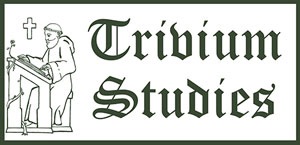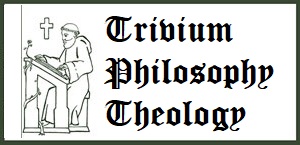
Trivium-Philosophy-Theology Primer: As a preparation for the
study of formal logic, this class introduces the basic vocabulary of
logic and the basic skills involved in recognizing and understanding
logical terms, and statements. In addition, first steps are taken in the
practices of using terms clearly, formulating judgments truthfully, and
even constructing simple arguments validly. The knowledge and skills
gained will make the transition into Trivium Studies 1: Traditional Logic easy and smooth.

Trivium-Philosophy-Theology 1: Formal Logic This class
emphasizes the structure of logical reasoning, the form that right
reasoning takes. It begins with an Aristotelian account of the three
acts of the intellect: simple apprehension, judgment, and reasoning.
These acts are verbalized as terms, propositions, and syllogisms,
respectively. With this background, the students learn the four types of
logical proposition, the square of opposition for understanding the
ways in which those propositions are related, and the rules for
combining propositions into syllogisms without error. The course
concludes with the consideration of various complex forms of the
syllogism and numerous case studies of famous arguments. The second half
of the year emphasizes the practice of "translating" and analyzing
"ordinary language arguments."

Trivium-Philosophy-Theology 2: Advanced Logic & Rhetoric The student who has been learning advanced grammar and syntax in the Latin cycle, and who has taken Logic will find a completion to our introduction to the mediaeval trivium in this class. First, we cover material logic; that is, we look at how to think about the content, rather than the form of logical reasoning. Then, drawing upon Aristotle's Rhetoric and other Greek and Roman works, we continue the exploration of what language and thought are, now focusing upon thought as expressed to others with the goal in mind of bringing other minds to truth.
Rhetoric the "modes of persuasion," beginning with logos already studies in logic class and then moving on to how we are motivated by what is attractive to our emotions (pathos) and noble to our wills (ethos). This necessitates an introduction to the philosophy of human nature in order to understand the faculties of reason, will, appetite, and sensation. In addition, the course offers a defense of rhetoric reliant upon beauty and lays out a practical imitative approach to composition, using the five canons.

Trivium-Philosophy-Theology 3: Intro to Philosophy - Nature, Man, & Science Having considered the universal tool of all science and art in logic and gained experience in the use of language to express what we know in rhetoric, we are now ready to consider the many things to which we can apply these skills. We begin by asking "What is science?" and "What are its divisions?" The answers to these questions set up a discussion of the question: "What does it mean to be wise?" In answer this, we explore the unified vision of ascendant education that stands behind the scholastic liberal arts and lay out a road map to guide the student as he transitions from the tools of learning to the sciences (natural, quantitative, and divine) that are the content of learning.
The course continues by digging down into the consideration of what would traditionally be called "natural science" and in more recent times the "philosophy of nature." Questions like "What is a nature?" "What is a living thing?" and "What is the purpose or point of the existence of each thing?" are considered. The course next narrows the focus to man: his nature, abilities, limits, freedom, and responsibilities--we will seek to define human nature and catalog its powers. Consideration will be given to the practices that set man apart from other animals, the unique inner life of man, and the deep dignity of the human soul. This consideration directs the students to the natural follow-up question "What is the point of human life?"